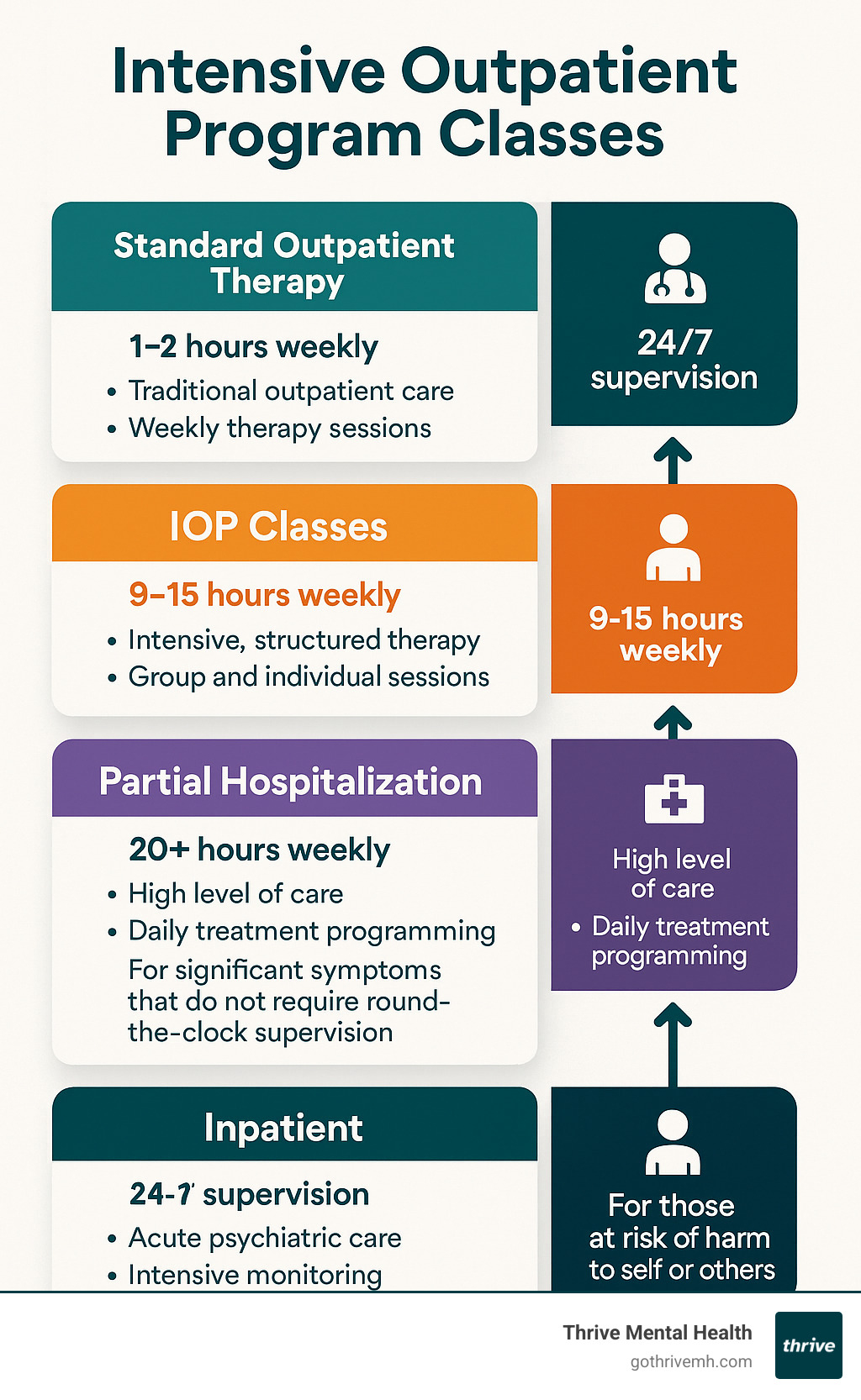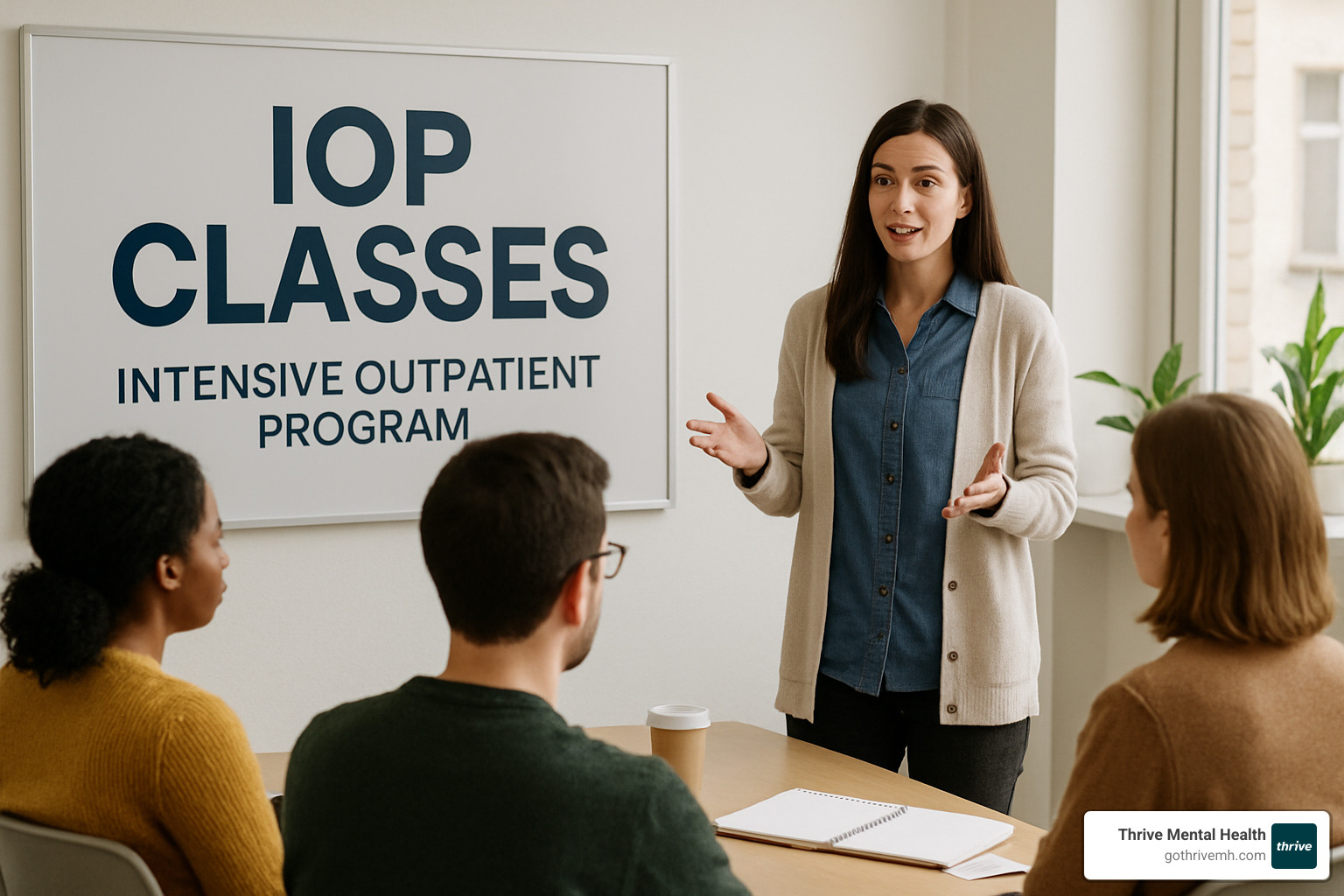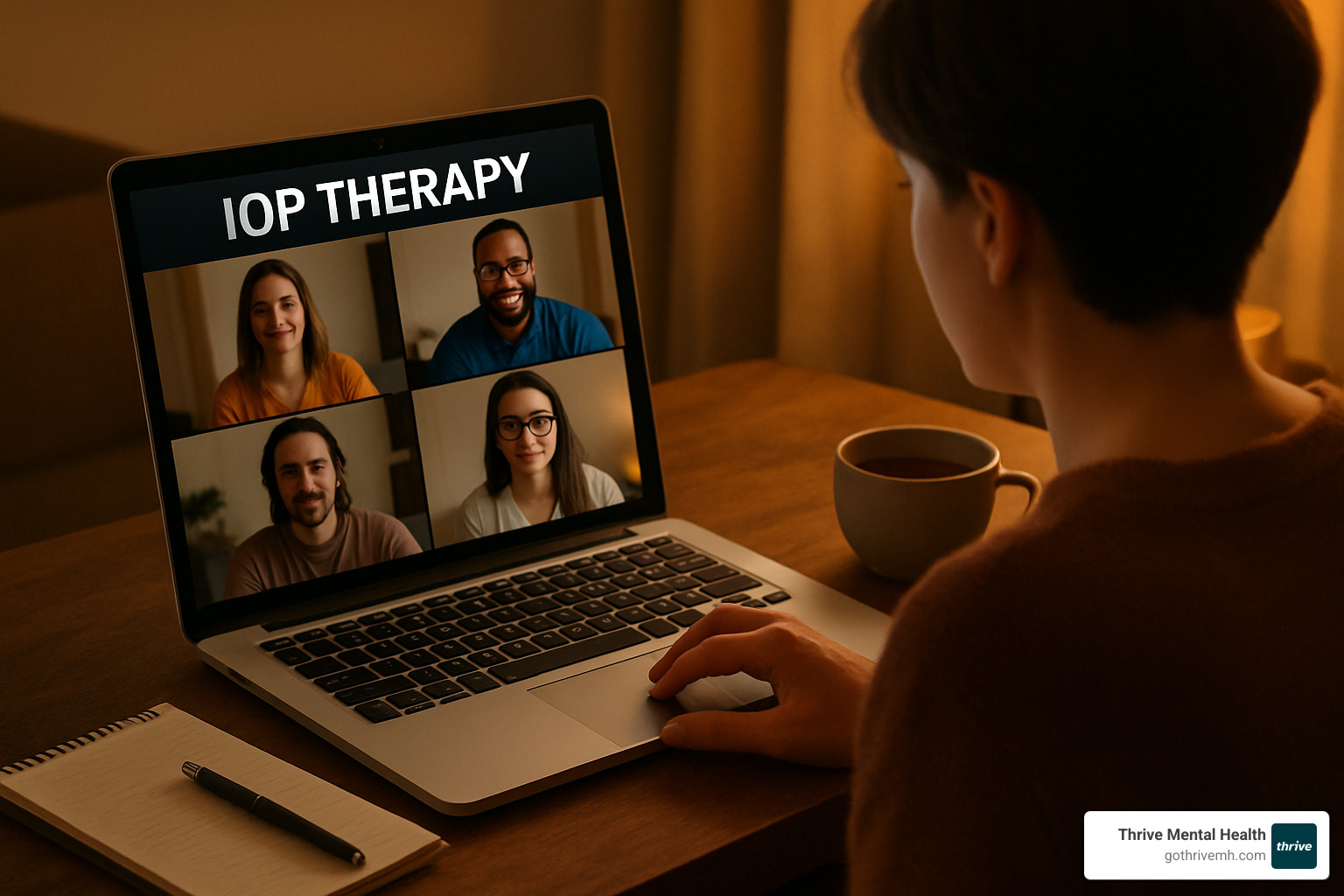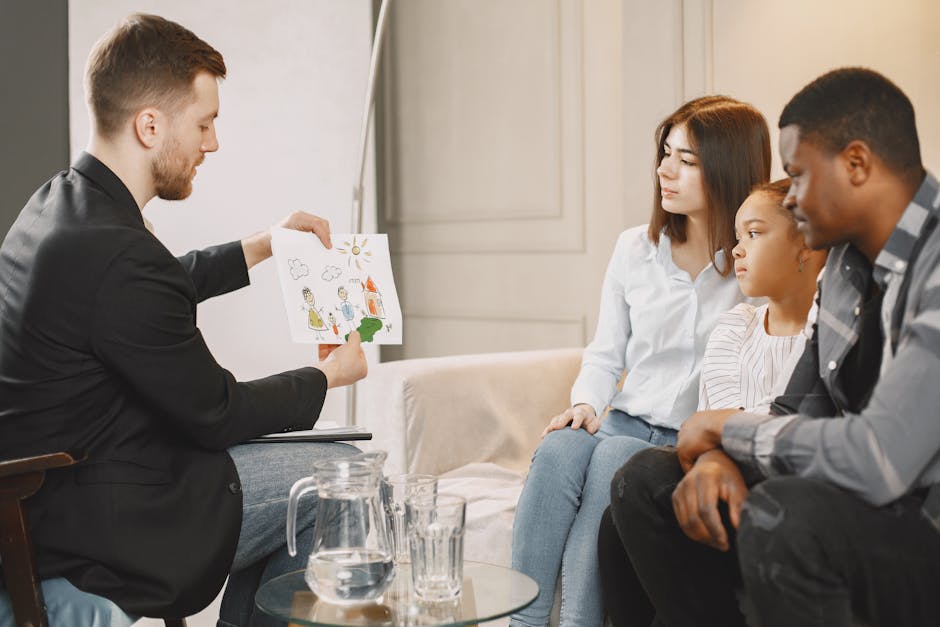IOP Classes 101: Intensive Help Without Intensive Hassle

Finding Mental Health Support That Fits Your Life
IOP classes (Intensive Outpatient Program classes) provide structured mental health treatment without requiring hospitalization or disrupting your daily life. These therapeutic sessions offer more support than weekly therapy while allowing you to maintain work, school, and family commitments.
What are IOP Classes?
- Definition: Structured therapy sessions that provide intensive care while you live at home
- Time Commitment: Typically 9-15 hours per week, often in 3-hour blocks
- Format: Combination of group therapy, individual counseling, and family sessions
- Duration: Most programs last 8-12 weeks
- Schedule Options: Morning, afternoon, evening, or virtual sessions available
IOP classes bridge the gap between standard weekly therapy and full hospitalization. They’re designed for people who need more support than once-weekly sessions but don’t require 24/7 supervision.
Research shows that outcomes from IOP treatment are comparable to inpatient care for many conditions, with the added benefit of letting you practice new skills in your everyday environment.
I’m Nate Raine, CEO of Thrive Mental Health, where I’ve helped develop and implement effective IOP classes that combine evidence-based treatments with flexible scheduling to meet the unique needs of our clients. My experience leading behavioral health innovations has shown me that accessible, intensive care can transform lives without requiring people to put their lives on hold.

Iop classes further reading:
What Are Intensive Outpatient Programs and How Do They Work?
Think of IOP classes as that perfect middle ground—more support than weekly therapy but without needing to live in a treatment center. At Thrive Mental Health, we’ve designed our intensive outpatient programs to fit into your life, not the other way around.
These programs typically involve at least 9 hours of treatment each week, usually spread across three 3-hour sessions. This structure gives you enough therapeutic support while still letting you sleep in your own bed, maintain your job, and stay connected with loved ones. The best part? Research shows that for many people, this approach works just as well as inpatient care—with the added bonus that you’re practicing new skills in your actual daily life, not in a bubble.
Our care teams include licensed therapists, counselors, and sometimes psychiatrists who work together like a well-oiled machine. Each professional brings different expertise to help address all aspects of your mental health journey.
IOP classes can serve different roles depending on where you are in your recovery:
For some, it’s a “step down” after leaving a hospital or residential program. For others, it’s the main treatment approach when weekly therapy isn’t quite enough. And sometimes, it’s a “step up” when standard outpatient care isn’t providing the support you need.
The beauty of IOP treatment is that you’re living at home while getting intensive help. This means you can immediately apply what you learn in therapy to real-life situations—like handling a stressful work meeting or navigating a challenging family dinner—and then bring those experiences back to your next session.
According to scientific research on drug addiction treatment, this level of care is particularly effective for substance use disorders when it includes evidence-based approaches like cognitive behavioral therapy and motivational interviewing.
IOP vs Inpatient vs Standard Outpatient
Choosing the right level of care can feel overwhelming. Here’s how these options compare:
| Feature | Standard Outpatient | IOP Classes | Inpatient Treatment |
|---|---|---|---|
| Time Commitment | 1-2 hours per week | 9-15 hours per week | 24/7 supervision |
| Living Arrangement | At home | At home | Residential facility |
| Treatment Focus | Maintenance, mild symptoms | Moderate symptoms, skill-building | Acute symptoms, crisis stabilization |
| Session Format | Primarily individual | Mix of group and individual | Group, individual, and milieu therapy |
| Cost | Lower | Moderate | Higher |
| Flexibility | High | Moderate | Low |
| Family Involvement | Optional | Regular component | Limited to scheduled visits |
| Duration | Ongoing, often months or years | 8-12 weeks typically | 5-30 days typically |
What’s reassuring is that research shows people who complete a well-structured IOP often have outcomes just as positive as those who complete inpatient programs for many conditions—but with much less disruption to daily life.
Typical Length & Phases
Most people participate in IOP classes for about 8-12 weeks, though everyone’s journey is unique. At Thrive Mental Health, our virtual programs typically run for 9-12 weeks, giving you enough time to make meaningful changes without feeling rushed.
Your IOP journey will likely unfold in four distinct phases:
During the Assessment Phase (your first week), we’ll get to know you—your history, symptoms, strengths, and goals. We’ll create your personalized treatment plan and help you get comfortable with the group setting.
The Active Treatment Phase (weeks 2-10) is where the real work happens. You’ll build essential skills, dive deep into therapeutic work, and regularly check your progress. We’ll adjust your treatment plan as needed and help you develop strategies to prevent relapse.
As you approach the end of the program, the Transition and Aftercare Planning phase (final 2-3 weeks) helps you gradually reduce session frequency while developing a solid continuing care plan. We’ll connect you with community resources and support systems to maintain your progress.
Even after completing the program, our Alumni Programming keeps you connected through support groups, check-ins, and community events. We believe in supporting your long-term wellness, not just getting you through the program.
This thoughtful, phased approach ensures you receive the right level of support at each stage of your recovery, with special attention to helping you transition successfully back to everyday life with your new skills and insights.
IOP Classes: Structure, Schedule, and Therapies

When you walk into your first IOP class, you’ll immediately notice the thoughtful structure that balances therapeutic depth with practical scheduling. At Thrive Mental Health, we’ve crafted our program to give you maximum benefit while respecting that you have a life outside of treatment.
Think of our IOP classes as a carefully choreographed dance of healing elements. You’ll experience psychoeducation sessions where you’ll learn about your condition and recovery principles—kind of like the “why” behind what you’re experiencing. Then there’s skills training, where you’ll pick up practical tools you can use right away when emotions get overwhelming.
The heart of our program often happens in process groups, where sharing your journey with others who truly get it creates a powerful healing environment. One client told me, “I finally felt like I wasn’t alone when I heard someone else describe exactly what I’ve been feeling for years.”
We don’t forget the importance of one-on-one attention, which is why individual sessions are built into the schedule. And because healing doesn’t happen in isolation, we include family sessions that bring your support system into the process. Research consistently shows that when families are involved, recovery outcomes improve significantly.
Our approach draws from proven therapeutic models. Cognitive Behavioral Therapy (CBT) helps you recognize and reshape unhelpful thought patterns. Dialectical Behavior Therapy (DBT) builds your emotional toolkit with mindfulness and distress tolerance skills. We also incorporate Motivational Interviewing, 12-Step Facilitation (when appropriate), and Acceptance and Commitment Therapy (ACT) to provide a comprehensive healing experience.
Group therapy forms the backbone of our IOP classes, creating a community of support that many clients find just as valuable as the formal therapy itself. As one participant put it, “Sometimes hearing how someone else handled a situation teaches me more than any worksheet could.”
Want to know more about what to expect? Check out our detailed guide: More info about what to expect
“iop classes” Daily Flow
A day in our iop classes follows a rhythm designed to keep you engaged while covering essential recovery ground. Most sessions run in 3-hour blocks, with options to fit your life:
Morning Sessions (9:00 AM – 12:00 PM) are perfect if you’re an early bird or have afternoon commitments. Afternoon Sessions (1:00 PM – 4:00 PM) work well if mornings are tough for you. And our popular Evening Sessions (5:30 PM – 8:30 PM) allow working professionals and students to get the help they need without disrupting their daytime responsibilities.
Each iop class begins with a check-in where you’ll share how you’re doing and set intentions for the session. This transitions into focused skill-building or educational time, where you might learn about managing anxiety triggers or communication techniques. We always include a short break to give your mind time to process and reset.
The second half typically features a deeper process group where you’ll apply what you’re learning to real-life situations. We close with mindfulness practice—a client favorite that one participant described as “the first time I’ve felt calm in months”—and a checkout that includes practical homework to try before your next session.
This thoughtful flow ensures you’re not just sitting passively but actively engaging with your recovery in different ways throughout each iop class.
Therapeutic Modalities Inside “iop classes”
Our iop classes blend science-backed approaches with creative therapies to address your whole person—not just your symptoms.
Cognitive Behavioral Therapy (CBT) serves as a cornerstone of our program, helping you identify those sneaky thought patterns that might be sabotaging your wellbeing. As one client shared, “I never realized how automatic my negative thoughts were until we started tracking them in group. Now I can catch them before they spiral.”
The DBT skills we teach give you practical tools for those moments when emotions feel overwhelming. Learning distress tolerance techniques has been life-changing for many clients who previously felt at the mercy of their feelings.
Acceptance and Commitment Therapy (ACT) offers a refreshing perspective that’s less about eliminating difficult thoughts and more about changing your relationship with them. It’s about moving toward what matters to you even when things are tough.
We complement these evidence-based approaches with art therapy sessions where you might express through color and form what words can’t quite capture. Our mindfulness practices teach you to anchor in the present moment rather than getting swept away by worries about the past or future.
For clients who might benefit from medication support, our psychiatrists work hand-in-hand with your therapy team. This integrated approach ensures everyone’s on the same page about your care.
Research consistently shows that this combination of therapeutic approaches yields better outcomes than any single method alone. We’ve seen this play out countless times as clients find which techniques resonate most strongly with their unique healing journey.
Who Should Enroll and How Is Progress Tracked?
Deciding if IOP classes are right for you is an important step in your mental health journey. At Thrive Mental Health, we’ve seen remarkable changes in people who need more than weekly therapy but don’t require round-the-clock care.
Our programs tend to be ideal for folks in several situations – perhaps you’re transitioning from a hospital stay and need continued support, or maybe your weekly therapy sessions just aren’t quite enough. Many of our clients maintain their jobs and family responsibilities while getting the intensive care they need.
We often see great results with young professionals who are balancing careers while working on their mental health. Our IOP classes are particularly effective for people managing dual diagnosis issues (when mental health and substance use concerns occur together).
What makes someone a good fit for our program? Generally, you’ll benefit most if you have:
- A stable and safe place to live
- The ability to stay sober or emotionally stable between sessions
- Some existing coping skills to build upon
- At least a small support network of friends or family
- A genuine desire to participate in your own healing
The research backs what we’ve seen – having supportive people in your corner significantly improves your chances of success. Our program data shows that 94% of clients who complete our IOP classes don’t need to return to higher levels of care like emergency rooms or inpatient facilities.
We don’t just hope you’re getting better – we track it carefully. Your progress is monitored through scientifically validated assessments, regular check-ins on your personal goals, tracking specific symptom improvements, noting functional changes in your daily life, and perhaps most importantly, listening to how you feel you’re doing.
The numbers speak volumes about our approach. Our clients report substantial improvements in anxiety (92%), depression (95%), and self-harm behaviors (89%) after completing our programs.
Family involvement can make a tremendous difference too. Scientific research on family therapy impact shows that bringing loved ones into the treatment process significantly improves outcomes – that’s why we make family therapy a core part of what we do.
Measuring Success & Personalizing Care
We believe that effective mental health care isn’t one-size-fits-all. When you join our IOP classes at Thrive Mental Health, we create a personalized treatment plan that reflects your unique situation, challenges, and goals.
Your individualized plan includes clear, measurable objectives that matter to you – not vague aspirations, but concrete goals you can see yourself achieving. We select evidence-based approaches specifically for your conditions and set up clear benchmarks so you can see your progress along the way.
Every week, we review how you’re doing and make thoughtful adjustments based on real data and your feedback. This might mean shifting the focus of your individual therapy sessions, connecting you with different group experiences, adding complementary therapies that might help, or coordinating with our psychiatry team if medication adjustments could be beneficial.
For example, if you’ve made great strides with depression but still struggle with anxiety, we won’t just stick to the original plan – we’ll adapt your treatment to focus more on anxiety management while maintaining the successful strategies that helped with your depression.
This responsive, personalized approach ensures that your time in our IOP classes remains relevant, effective, and focused on what matters most – your healing and growth.
Virtual & Evening IOP Options: Flexibility Without Compromise

Life doesn’t stop when you need mental health support. That’s why at Thrive Mental Health, we’ve created virtual and evening IOP classes that fit into your real life while still delivering the comprehensive care you deserve.
Our virtual platform isn’t just another frustrating video call – we’ve thoughtfully designed a HIPAA-compliant telehealth experience specifically for therapeutic engagement. We know “Zoom fatigue” is real, so we’ve structured our online IOP classes to keep you connected and engaged, preserving the supportive community feeling that makes group therapy so powerful.
For those who can’t attend during business hours, our evening sessions from 5:30 PM to 8:30 PM have become one of our most popular options. These after-hours IOP classes have been a game-changer for working professionals, college students, parents juggling childcare, and those caring for family members.
“Being able to log in from home after work made it possible for me to get the help I needed without having to choose between treatment and my job,” shared one recent participant.
What might surprise you is that research shows virtual IOP programs, when properly structured, produce clinical outcomes equivalent to in-person care. Our own results confirm this – participants in our virtual programs show similar improvement rates to those attending in-person.
Our virtual IOP typically runs for 9-12 weeks, custom to your individual needs and progress. Throughout this time, you’ll participate in group therapy three times weekly, weekly individual sessions, regular family therapy, and psychiatric consultation as needed – all with the same clinical excellence as our in-person programs, just more conveniently delivered.
Benefits of Remote IOP Classes
There’s something uniquely powerful about accessing intensive mental health care from your own comfortable space. Our clients consistently tell us that virtual IOP classes remove barriers that might otherwise prevent them from getting help.
The geographic freedom is life-changing for many – you can access our specialized care from anywhere in Florida, eliminating transportation challenges and expanding your options beyond what’s locally available. This means no more rushing through traffic, hunting for parking, or worrying about bad weather – you can focus your energy on healing instead of logistics.
Many clients find they’re more comfortable sharing in therapy when they’re in their own space. The privacy of virtual sessions can reduce stigma concerns and create a sense of safety that promotes more authentic participation. Plus, you’re literally practicing new skills in the environment where you’ll use them, creating a direct bridge between therapy and daily life.
The flexibility of virtual IOP classes also means you can maintain consistent attendance even during travel, minor illness, or other circumstances that might disrupt in-person treatment. This continuity is incredibly valuable for your progress.
Perhaps most importantly, our virtual groups connect you with peers from diverse backgrounds and locations across Florida. This rich variety of perspectives often improves the group experience in unexpected ways, creating connections that might never have formed in a traditional setting.
We’ve seen how this accessibility dramatically increases program completion rates. When getting help doesn’t require putting the rest of your life on hold, healing becomes possible for so many more people.
Choosing the Right IOP Classes: A Practical Checklist
Finding the perfect intensive outpatient program doesn’t have to feel overwhelming. Think of your search as assembling a personal care team that fits your unique needs and lifestyle. At Thrive Mental Health, we’ve guided hundreds of people through this decision, and we’ve learned what truly matters when selecting the right IOP classes.
When exploring your options, consider these essential elements that form the foundation of quality care:
Start with the basics: look for programs with proper accreditation and licensed clinical staff who specialize in your specific concerns. The best programs proudly share their credentials and staff qualifications because they understand these foundations matter. Evidence-based approaches should form the backbone of any program you consider – treatments proven by research to actually work.
Your schedule matters tremendously. One of the most common reasons people don’t complete treatment is simply because it doesn’t fit into their life. Look for IOP classes that offer flexible scheduling options, including evenings or virtual sessions if you’re juggling work or family responsibilities. At Thrive, we’ve designed our programs specifically for busy adults who need care that works around their commitments, not against them.
The financial piece is equally important. Check whether programs accept your insurance and what your out-of-pocket costs might be. Many quality programs (including ours) offer payment plans or sliding scale options to make care more accessible. Don’t hesitate to ask detailed questions about costs – transparent programs will give you clear answers.
Pay attention to group size too. The sweet spot is typically 8-12 participants, which allows for meaningful connections while ensuring everyone gets adequate attention. Smaller isn’t always better, as groups need enough participants to generate diverse perspectives and support.
Healing continues beyond the program itself. Research consistently shows that strong aftercare planning leads to significantly better long-term outcomes. Ask about alumni support, community connections, and how the program will prepare you for the transition back to regular life. At Thrive Mental Health, we begin planning for this transition from day one, ensuring you’re never left wondering “what’s next?”
More info about finding programs
Questions to Ask Providers
When you’re researching potential IOP classes, having a conversation with providers can reveal so much more than their website ever could. Here are some questions that our most successful clients typically ask before enrolling:
About the actual treatment, ask how the program tailors care to individual needs rather than offering one-size-fits-all solutions. Find out which therapeutic approaches they use and whether they match what works best for your specific concerns. Understanding the balance between group work and individual attention can help set realistic expectations.
Group dynamics matter enormously in IOP classes. Ask about typical group size and how groups are organized – whether by age, diagnosis, or other factors. This gives you insight into who you’ll be sharing your healing journey with and whether you’ll likely feel comfortable in that environment.
Don’t shy away from practical questions about policies. What happens if you get sick and miss a session? How does the program handle emergencies outside regular hours? These scenarios happen in real life, and knowing the protocols can provide peace of mind.
Perhaps most importantly, ask about how they’ll know you’re making progress and when you’ll be ready for the next step in your care journey. Quality programs have clear methods for measuring improvement beyond just “how do you feel?”
At Thrive Mental Health, we welcome these questions because we believe informed clients make better partners in the healing process. We’re transparent about our approaches, our structure, and our expectations because we know that trust forms the foundation of effective treatment.

Frequently Asked Questions about IOP Classes
What conditions are treated in IOP classes?
Mental health challenges come in many forms, and IOP classes are designed to meet people where they are. At Thrive Mental Health, our programs help individuals dealing with a wide spectrum of difficulties, including:
Mood disorders like depression and bipolar disorder often respond well to the structured support that IOP provides. Many clients come to us feeling overwhelmed by persistent sadness or mood swings that have begun interfering with their daily lives.
Anxiety disorders – from generalized anxiety to panic disorder and social anxiety – are also commonly addressed in our programs. We’ve seen remarkable progress in clients who previously felt paralyzed by worry or fear.
For those healing from trauma, our IOP classes offer specialized approaches for PTSD and adjustment disorders, creating a safe space to process experiences and develop resilience.
Substance use disorders are treated with compassion and evidence-based approaches, provided you’re medically stable and past the acute withdrawal phase. Many of our clients appreciate being able to work on their recovery while continuing to live at home.
We’re particularly experienced in helping those with co-occurring disorders – when mental health and substance use challenges happen simultaneously. Our integrated approach addresses both concerns together, rather than treating them as separate issues.
Our programs also support those managing personality disorders, OCD and related disorders, and in some specialized programs, eating disorders (for mild to moderate cases).
IOP classes work best for those who are medically stable and not at immediate risk of harm. If you’re in crisis, you might start with more intensive care before transitioning to our IOP program.
How long do IOP classes usually last each week?
Life doesn’t stop when you need mental health support – we get that. That’s why our IOP classes are designed to provide intensive care while still fitting into your life.
Most participants at Thrive Mental Health commit to 9-15 hours each week, typically spread across three days. Our standard schedule includes:
Monday, Wednesday, and Friday sessions, each lasting about 3 hours. These core group sessions form the backbone of your treatment experience, offering consistent support throughout the week.
In addition to these group sessions, you’ll have a weekly one-hour individual therapy session custom specifically to your needs, plus family therapy (usually 1-2 hours) to strengthen your support system.
“The schedule was intense enough to make real progress, but flexible enough that I could keep my job,” shared one recent graduate of our program. “That balance was exactly what I needed.”
For those juggling work or school commitments, our evening programs (5:30 PM – 8:30 PM) have been a game-changer. We also offer virtual attendance options and combination schedules where you might attend some sessions in person and others online.
As you progress through the program and begin to thrive, you might find your weekly time commitment gradually decreasing. This step-down approach helps ensure a smooth transition back to everyday life with your new skills and insights firmly in place.
Are family members involved in IOP classes?
Healing happens in connection with others – especially those closest to us. That’s why family involvement is such a vital part of our IOP classes at Thrive Mental Health.
Research consistently shows that when families participate in treatment, outcomes improve significantly. It makes sense – the people you live with and love influence your environment, understand your history, and play a crucial role in supporting your ongoing wellness.

Our approach to family involvement takes several forms:
We schedule weekly family sessions where you and your loved ones work together with a therapist to improve communication and understanding. These sessions often become powerful turning points in treatment.
Our family education groups help your support system better understand what you’re experiencing and how they can help – without overstepping or enabling unhealthy patterns.
Many families find tremendous value in our multi-family groups, where they connect with others walking similar paths. The sense of “we’re not alone in this” can be profoundly comforting.
We also provide practical communication skills training that families can implement right away to create a more supportive home environment.
“Who counts as family?” is entirely up to you. We recognize that family means different things to different people – partners, parents, siblings, children, close friends, or other significant supporters in your life can all participate.
The benefits of including your loved ones are substantial: a more supportive home environment, improved family dynamics, better understanding of your needs, stronger long-term support, and often, healing of strained relationships.
As one client told us, “Having my partner involved in treatment helped them understand what I was going through in a way my explanations never could. Now they know how to support me when things get tough.”
Conclusion
IOP classes represent that sweet spot in mental health treatment many people are searching for—structured enough to create real change, yet flexible enough to fit into your actual life. This balance isn’t just convenient—it’s incredibly effective, allowing you to practice new skills in your everyday environment rather than the artificial setting of a hospital.
We’ve witnessed at Thrive Mental Health how our IOP classes transform lives across Florida. There’s something powerful about watching someone rebuild their mental health while continuing to show up for work, school, or family. It’s not about putting your life on hold for treatment—it’s about weaving treatment into the fabric of your life.
What makes IOP classes so valuable? They deliver intensive support (9-15 hours weekly) without uprooting you from your home. The combination of group sessions where you connect with others facing similar challenges, individual therapy custom to your specific needs, and family involvement creates a comprehensive approach to healing. Most programs run for 8-12 weeks, guiding you through a thoughtful progression from intensive support to greater independence.
Perhaps most importantly, IOP classes now come in formats that respect your reality—morning sessions for night owls, evening groups for working professionals, and virtual options for those balancing complex schedules or preferring the comfort of home. And yes, these programs are typically covered by insurance as medically necessary care, with outcomes research showing results comparable to inpatient treatment for many conditions.
If you’re caught in that frustrating middle ground—where weekly therapy isn’t quite enough, but hospitalization feels too extreme—IOP classes might be exactly what you’ve been looking for. The structured support, meaningful connections with peers, and practical skill-building can provide the momentum needed to move forward while maintaining your independence.
We welcome you to reach out to our team at Thrive Mental Health to learn more about our Florida-based IOP classes. Our admissions specialists can walk you through the details, check your insurance coverage, and help determine if our approach aligns with your needs.
Taking that first step toward more intensive treatment can feel intimidating—I understand that completely. But remember that seeking help isn’t a sign of weakness; it’s an act of courage and self-care. The right support at the right time can make all the difference in your journey toward better mental health and a more fulfilling life.